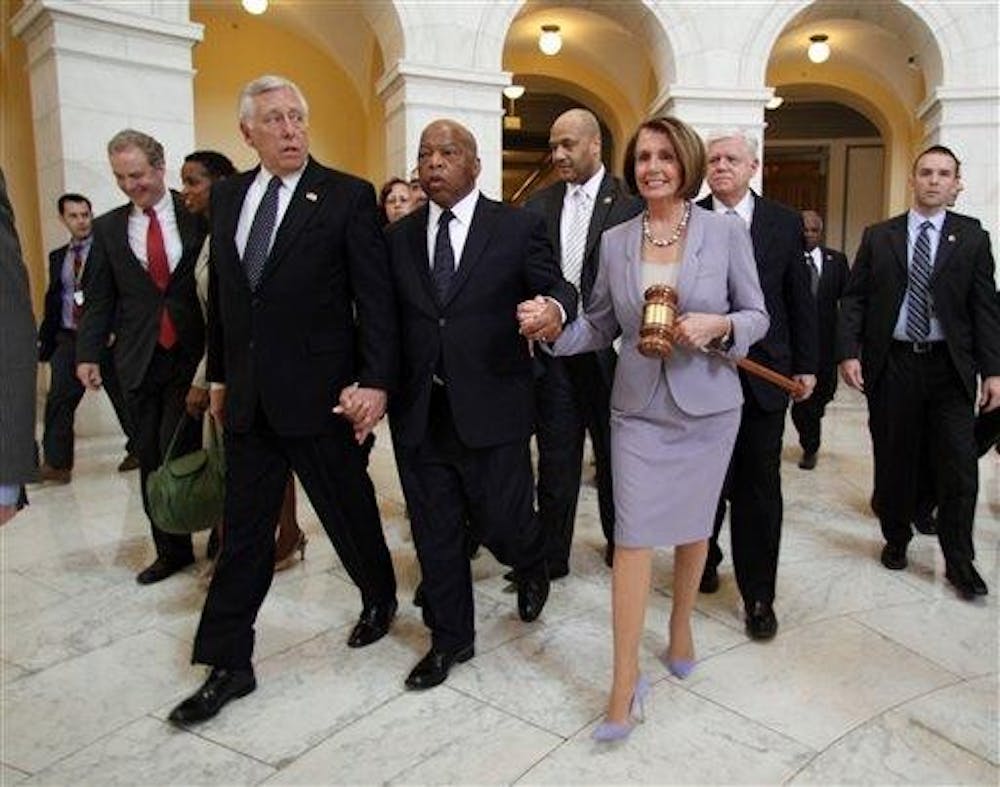WASHINGTON — A pair of House Democratic leaders predicted Sunday the final tally on President Barack Obama’s historic health care bill will meet or exceed the 216 votes required for passage. But they acknowledged having yet to nail down commitments from a handful of members, some of whom remained concerned about the abortion issue.
Rep. Bart Stupak, D-Mich., said he was one of about a half-dozen anti-abortion Democrats who were working out language for a presidential executive order that would provide more assurances that no public money would be used for elective abortions.
“Until we get matters signed, sealed and delivered ... our votes are still no,” Stupak said on MSNBC. “If we get this thing resolved, then they’ll have more than enough votes.”
Still, Democratic leaders sounded optimistic that they’d get to or beyond 216 votes.
“There are still members looking at it and trying to make up their minds,” House Democratic leader Steny Hoyer, D-Md., said on NBC’s “Meet the Press” in the hours before the vote. He added that the holdouts numbered in “the low single digits.”
“We think there are going to be 216-plus votes when we call the roll,” Hoyer said.
Rep. Debbie Wasserman Schultz, D-Fla., the party’s deputy whip, also said the votes were not yet in hand, telling “Fox News Sunday” that Democrats were still short of “a hard 216.”
Republicans attributed the caution to public controversy over the plan, which played out in angry protests at the doorstep of the Capitol during Congress’ rare weekend session. At issue was Obama’s signature domestic issue and the most significant legislative overhaul in decades: a rewrite of the nation’s health care system to provide coverage to millions of people.
The Democrats’ vote-counting whip in the House, Rep. James Clyburn of South Carolina, said some in his caucus remained concerned about what the bill would mean for elective abortions.
It was unclear whether Obama would agree to issue an executive order, but Clyburn said more would be known by Sunday afternoon. Long-standing federal policy bars U.S. aid for abortions except in cases of rape, incest or when the mother’s life is in danger.
One Democrat who had been undecided because of her concerns over abortion funding, Rep. Marcy Kaptur, D-Ohio, stepped into the “yes” column just hours before voting was to begin.
“We have received assurances that we will work with the administration to assure that existing law is maintained — not to change it in any way, but to make sure that it applies to this bill,” Kaptur said.
Another snag involved widespread distrust among House members that the Senate would be able to pass the “fixes” to the bill. Clyburn’s Senate counterpart, Sen. Dick Durbin of Illinois, said on CBS’ “Face the Nation” that he has commitments of support from at least a majority of the 100-member chamber, but Democratic leaders have not released a list of supporters.
The last-minute holdups gave the House vote scheduled Sunday a measure of suspense, despite the Democrats’ optimism. House Democratic Caucus Chairman John Larson of Connecticut stopped just short of declaring victory.
“We have the votes now — as we speak,” Larson said on ABC’s “This Week.”
Republicans remain resolutely opposed to the legislation and warned they will make Democrats pay dearly in the fall elections if the fiercely debated measure becomes law.
“The American people don’t want this to pass. The Republicans don’t want this to pass. There will be no Republican votes for this bill,” Rep. Eric Cantor of Virginia, the House’s second-ranking Republican, told ABC.
With Obama’s emotional appeal from Saturday ringing in their ears, House Democratic leaders prepared for three showdown votes when they convene at 1 p.m. EDT and begin voting an hour later: on a “rule” to establish debate guidelines; on a package of changes to a Senate-passed bill, including deletion of special Medicaid benefits for Nebraska; and on the Senate bill itself, the focus of intense national debate for months.
Democrats need 216 votes to pass each one. With all 178 Republicans and at least two dozen Democrats vowing to vote no, the legislation’s fate lay in the hands of the Democrats who remained uncommitted ahead of Sunday’s vote.
If Democratic leaders prevail on all three House votes, Obama could sign the Senate version of the bill into law. The bill of “fixes” would go to the Senate under fast-track debate rules, called reconciliation, that would enable Democrats to pass it without facing a Republican filibuster.
Democrats control 59 of the Senate’s 100 seats, one vote shy of the number needed to overcome bill-killing filibusters from a united GOP.
House Democrats have long insisted that senators agree to change the bill that the Senate passed on Christmas Eve. Since then, it became deeply unpopular with many Americans, because of the special deal for Nebraska, a new tax on generous employer-provided health plans and other aspects.
The legislation, affecting virtually every American and more than a year in the making, would extend coverage to an estimated 32 million uninsured, bar insurers from denying coverage on the basis of existing medical conditions and cut federal deficits by an estimated $138 billion over a decade.
Congressional analysts estimate the cost of the two bills combined would be $940 billion over a decade.
Dems hopeful on health care passage

Get stories like this in your inbox
Subscribe



